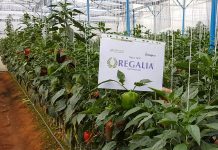Jim Lane
![Cereslgo[1].jpg](http://www.altenergystocks.com/wp-content/uploads/2017/08/Cereslgo_1_.jpg) Ceres, Inc. (CERE) and Syngenta sign a major deal to stimulate sweet sorghum adoption. Brazilian producers seek paths for expanding ethanol production.
Ceres, Inc. (CERE) and Syngenta sign a major deal to stimulate sweet sorghum adoption. Brazilian producers seek paths for expanding ethanol production.
What are sorghum’s chances of being the darling of the expansion story?
In California, Ceres, Inc. (CERE) announced that it has signed a sweet sorghum market development agreement with Syngenta. The companies will work together to support the introduction of sweet sorghum as a source of fermentable sugars at Brazil’s 400 or more ethanol mills.
Under the agreement, Syngenta and Ceres intend to collaborate on small-scale trials as well as larger demonstration-scale field evaluations with mills this season. Syngenta will provide its considerable agronomy resources to evaluate its portfolio of crop protection products alongside Ceres hybrids, and Ceres will provide both seed and research support. Both companies will coordinate outreach to ethanol mills and develop industry training programs.
Brazil and sweet sorghum
The prospects of sweet sorghum, once the hybrids have proven themselves in local trials, are robust in Brazil: The crop can extend the ethanol production season by up to 60 days in Brazil, can be grown on fallow sugarcane land and processed using the same equipment, and requires less water and other inputs than sugarcane. Brazil’s government announced in its annual agricultural plan for 2012-2013 that sweet sorghum would be considered a strategic crop.

The geography of Ceres’ sweet sorghum product trials in Brazil |
Ceres and the Brazilian market
Last season, Brazilian mills planted Ceres sweet sorghum on more than 3,000 hectares (7,400 acres), and the company has completed the registration process in Brazil for its new generation of sweet sorghum hybrids.
Last season in Brazil trials of these new hybrids demonstrated large increases in biomass, extractable juice volume and total harvestable sugar compared to commercial products introduced just last year. In product development trials and at the company’s breeding center, where field evaluation plots are irrigated and managed more closely than commercial fields, these hybrids averaged 80 or more metric tons per hectare. Subsequent field evaluations in the Southeast U.S. this summer have confirmed similar results.
That’s the good news.
A slowdown in adoption
On the negative side, roll-out of Ceres’ new hybrids is slower than expected. Where the company expected planting in the tens of thousands of hectares this year, it will remain in the thousands, according to management, for the 2012-13 cane season.
Accordingly, Michael Cox at Piper Jaffray wrote that “Due to the drought conditions in Brazil during the last growing season, field trial yields for CERE sweet sorghum hybrids were down resulting in a slower adoption of the seed technology in the upcoming FY13 planting season…we are shifting our model out by a year and lowering our price target. Despite the expectation of lower planted hectares in FY13, we believe the likely increase in ethanol blending in Brazil next year will increase demand for sweet sorghum and ramp product adoption.”
The path to stimulating product adoption
In its most recent management call, the company pledged to use creative efforts to market the new hybrid seed. Hence the Syngenta deal – and overall, Ceres said that it expects to work with more than 20 mill customers, up 40 percent from last year.
The bottom line
Brazilian ethanol production needs to grow, affordably – the country’s fuel demand continues to be strong, yet producers would like to expand sugar production to take advantage of high global prices. Sweet sorghum offers compelling options – if the hybrids work economically, and if the adoption is there.
To help push product adoption, CERE is implementing creative means to market the new hybrid seed. Additionally, management expects to work with more than 20 mill groups, which is a nearly a 40% increase in milling customers.
At Raymond James, energy analyst Pavel Molchanov wrote: “It goes without saying that collaboration with a leading agribusiness company like Syngenta represents further endorsement of Ceres’ technology and the viability for rising adoption of sweet sorghum by Brazilian mill owners.”
Given the parallel news this week Raizen is beginning to provide increased visibility on its goal of increasing its production by more than 50 percent, in a $7 billion investment program, sweet sorghum remains at the epicenter of the Brazilian ethanol expansion story – even if its timeline of adoption looks slower in the mid-term as Brazil recovers from drought.
One note in this week’s announcement we’ll continue to track: the emphasis on evaluating Syngenta crop protection products with Ceres hybrids. That could mean fungicides and herbicides – both may be needed to assure a healthy growing environment for sweet sorghum going forward – and the news may generate some ideas about yield shortfalls during last year’s drought-affected season.
Disclosure: None.
Jim Lane is editor and publisher of Biofuels Digest where this article was originally published. Biofuels Digest is the most widely read Biofuels daily read by 14,000+ organizations. Subscribe here.








